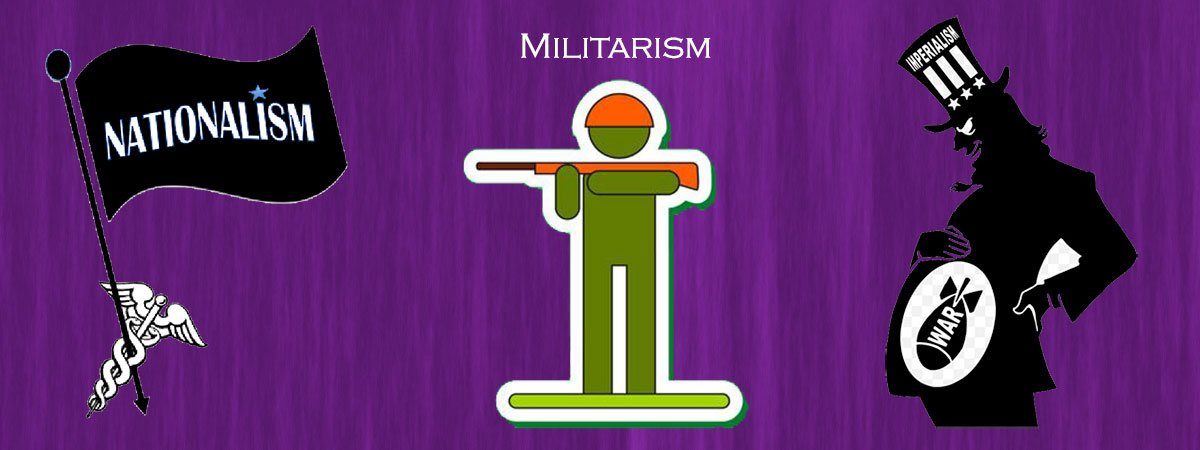World War I was a global conflict that began in Europe on July 28, 1914 and soon spread across the world involving more than a 100 nations in some way or other. It went on for more than four years ending on November 11, 1918. Also known as the Great War, it pitted the Central Powers of Germany, Austria-Hungary, the Ottoman Empire and Bulgaria against the Allies which was a coalition of many nations, most prominently the Great Britain, France, Russia, Japan and Italy. There were numerous causes that led to the First World War. Historians usually abbreviate its main causes as MAIN: Militarism, Alliances, Imperialism and Nationalism. Apart from these, other causes of the war include the rise of Germany as a major power, media propaganda and politics of the Balkans. The immediate cause of the war was the assassination of Archduke Franz Ferdinand, the heir to the Austro-Hungarian Empire; which was followed by the July Crisis. Know what precisely led to World War I through its 10 major causes.
#1 The Rise of Germany
Most of the 19th century was dominated industrially, militarily and economically by Great Britain and France. This dominance was however being continuously challenged after the unification of Germany in 1871. The German growth story was rapid with its production and exports quickly catching up with the British and the French. Germany was investing in and benefiting from modern industries like the electrical and chemical industries. Moreover, it was becoming a leader in textiles. The annexation of Alsace and Lorraine from France had boosted coal production; and the planned Berlin-Baghdad Railway, which would link Germany to the oilfields in the Persian Gulf, was making its competitors nervous. By the end of the 19th century, Germany had become the largest economy in Europe and wanted to further its ambitions as a global power.
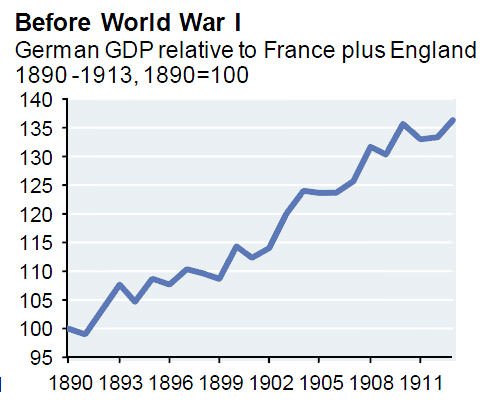
#2 Franco-German War and Annexation of Alsace and Lorraine
The Franco-German War, sometimes also called the Franco Prussian War was fought between a coalition of German states, led by Prussia; and France in 1870–71. The war resulted in a catastrophic defeat for France and the end of its dominance in Central Europe. It also marked the emergence of a unified Germany led by Prussia, with King William I of Prussia proclaimed as the German emperor. As a consequence of the loss, France had to accept the terms of the Treaty of Frankfurt in 1871 which demanded it to pay five billion francs in gold as war indemnity in five years. Even more humiliating was the giving up of the resource rich (iron ore and coal) and militarily strategic territories of Alsace and Lorraine. The German annexation of Alsace and Lorraine hurt French pride, arousing a longing for revenge among the population. Thus French determination to recover Alsace-Lorraine and Germany’s escalating ambitions as a global power kept the two nations poised for conflict.
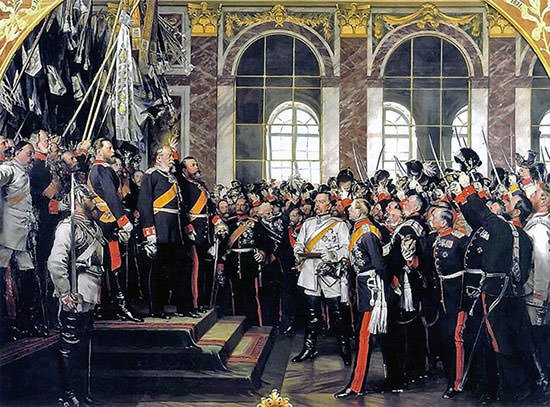
#3 Militarism
The idea of Militarism is the belief that a country should maintain a strong military capability, and be open to the idea of using it aggressively to defend itself or to promote its own national interests. In the years prior to the First World War, the ruling governments of several European nations were guided by the philosophy of Militarism. The country’s military leaders advised the political leaders, influencing domestic policy and demanding increase in defense and arms spending. Though human history had always favored strength and military might, the quest for dominance along with competition, unstable political situation and lack of trust meant that powers across Europe began rapidly expanding their armies leading to ‘the arms race’. In the times leading up to the war, Germany attempted to build a navy that could eclipse Britain’s, while Britain pushed to develop its forces to avoid this. Germany developed mobilization systems to call men to war quickly. Also, Russia, Germany and France trained many men as non-active military reserve forces. Moreover, the enormous spending in the arms race meant development of military technology and production of more lethal and destructive weapons.
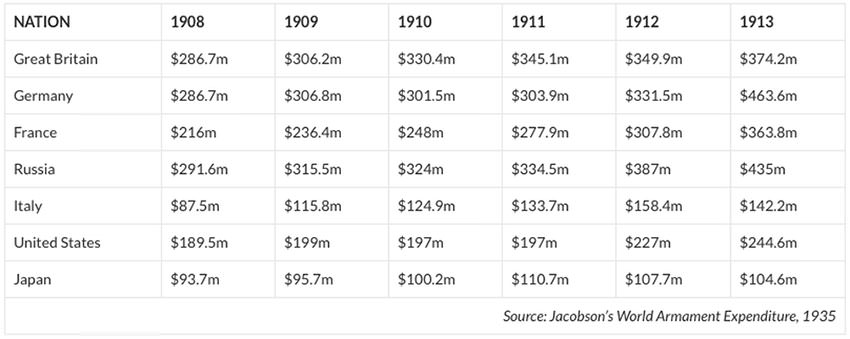
#4 Imperialism and Scramble for Africa
Imperialism is a system where a nation or state (imperial power) establishes control over another nation or state or land (colony) and uses its people and resources to enrich and empower itself. The British control over vast colonial territories, like India, Australia and Canada among others, had established it as the primary global power in the world. Africa was the land for ‘new imperialism’ towards the late 19th century with only 10 percent of it being under formal European control until 1870. This number would increase to 90 percent when the First World War would commence. Germany had entered the colonial race much later only to find that all the best territories and strategic ocean highways were already dominated by Britain, France and others. In the late 19th century’s ‘scramble for Africa‘, Germany managed to annex Namibia, Cameroon, Togoland and Tanganyika. They made continuous efforts to connect their south west colonies with their eastern colonies. This threatened British expansion north from their Cape colony at the southern tip of the continent. Colonies were necessary for investment, resources, raw materials and markets for manufacturers; and there was fierce competition to guard these markets and look for opportunities to expand them.
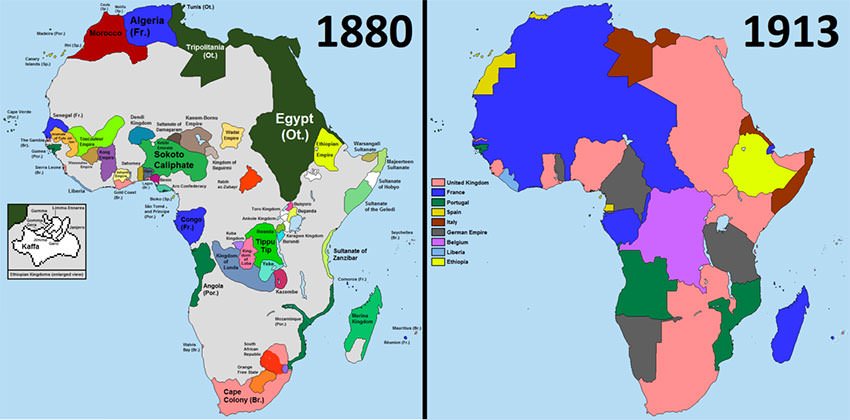
#5 Fierce Nationalism
In the times preceding the First World War, the citizens of many European nations, especially the colonial powers, were convinced that their nations occupied a position of cultural, economic and military superiority in the world. This nationalist fervor meant that the leaders and media exaggerated their own importance while looking down and ridiculing the others. The politicians and other men in top positions, along with the media, contributed to this mindset. Provocative remarks and rhetoric were common in tabloids and nationalistic ideas were common in literature, art and music.
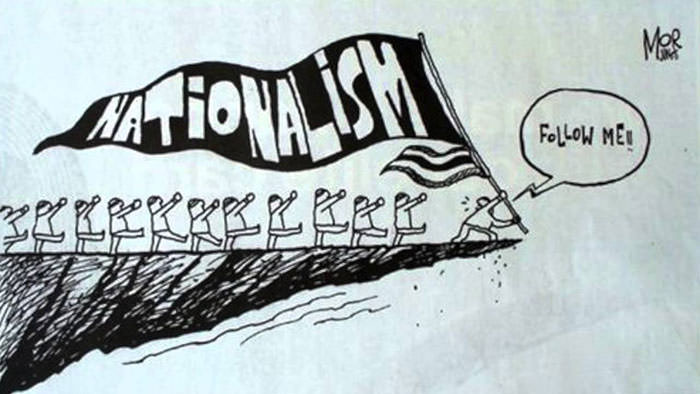
There was delusion about the military capability among the Great Powers, with the British glorifying its navy, the Germans showing full faith in their efficacy and the Russian Tsar believing his empire was ordained by God and protected by the largest standing army in Europe of 1.5 million men. Moreover, their own countries were always righteous and fair while the others were conniving, evil, backward and aggressive. The outcome of this warped mindset was an inflated confidence in their own nation with war being considered both justified in times of global competition and necessary to progress further.
Also, nationalism had taken a different shape in the Balkan region where ethnic groups like the Bosnians, Greeks, Bulgarians and Macedonians were aspiring for political independence from large empires like the Ottoman and the Austro-Hungarian empires. Mostly backed by the Russians, these groups destabilized Eastern Europe making it a center of political power play in the lead up to the First World War.
#6 Media Propaganda and Invasion Literature
In the years leading to the Great War, the media and literature in Europe was soaked in nationalism and propaganda, which had a great impact on the masses. The narrative of being the best and having a much superior culture, mannerisms and military might was enthusiastically received by the public. In Britain, the popular Rule Britannica! Song was sung, which contained the following lyrics:-
"The nations not so blest as thee Must, in their turn, to tyrants fall, While thou shalt flourish great and free: The dread and envy of them all." Rule, Britannia! Britannia, rule the waves! Britons never, never, never shall be slaves.
The Germans were building their own narrative which propagated their own interests. Here the British were seen as avaricious, hypocritical and obsessed with money as it became the popular target of pre-war German press. Such media propaganda was widespread across Europe and was a major catalyst in building nationalist fervor and opinions favorable for war. Moreover, a lot of material written during the times added fuel to fire with their racial profiling of other races, which in turn led to xenophobia. Many novels, some of them bestsellers, aroused imaginations and anxieties about hypothetical invasions by foreign powers. These stories would later be categorized under ‘invasion literature’.

#7 Politics of the Balkans
The Balkan Peninsula refers to the area between the four seas; Black Sea, the Mediterranean, the Adriatic and the Aegean. In the late 19th century, this area east of Europe, including nations and provinces like Greece, Bulgaria, Serbia, Macedonia and Bosnia, was an area of political instability and conflict. In those times, this area was the European territory of the Ottoman Empire with various ethnic groups fighting for their independence. Moreover, this area was of keen interest to the major powers for its strategic location.
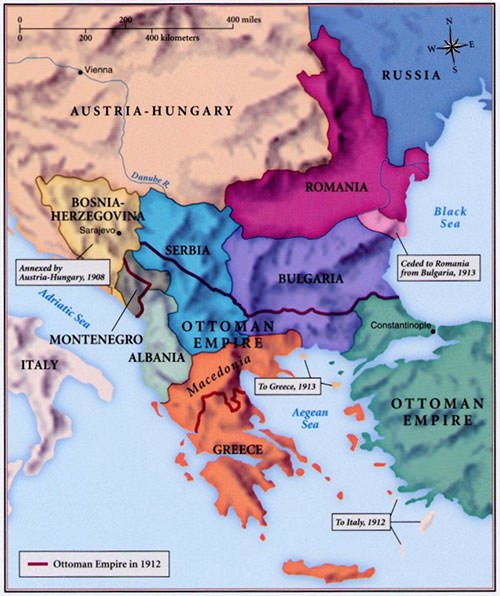
Russia, having cultural ties with the Slavic, followed a pan-Slavic foreign policy in the region, supporting Bulgaria and Serbia. This was also in keeping with its aim of accessing the waters of the Mediterranean from the Black Sea. The British wanted to deny Russia their goal. They thus supported the continuation of the Ottoman Empire. As did Austria-Hungary, since it was itself a combination of multinational entities, and the collapse of the Ottoman Empire may have weakened it. The French wished to strengthen its position in the region while Italy wanted to deny any major sea power access to the Adriatic Sea. The Germans, on the other hand, were eyeing the Ottoman Empire as their future colony. The region was thus not wrongly referred to as the “powder keg of Europe”. The politics of the Balkans was heating up and this led to the Balkans Wars in 1912–13, which fractured the Ottoman Empire and laid the grounds for the First World War.
#8 Assassination of Archduke Franz Ferdinand
In the tumultuous Balkan Region, Serbian nationalism was growing strong in the early 20th century and the ascension of a new king more favorable to the Russians in 1903, threatened Austria-Hungary. This led to bitterness between the neighbors and the “pig war” of 1906, during which trade frontiers were closed, majorly affecting the export of Serbian pigs to Austria-Hungary. The move also increased Serbia’s nationalist ambitions with regard to Bosnia, a trade outlet to the Adriatic Sea. In 1908, the situation worsened in what is called the Bosnian Crisis, when Austria-Hungary announced the annexation of Bosnia and Herzegovina, territories formerly within the sovereignty of the Ottoman Empire. In June 1914, a Serbian-nationalist terrorist group called the Black Hand sent groups to assassinate Archduke Franz Ferdinand, the heir to the Austro-Hungarian Empire. On, 28th of June 1914, while on a visit to Sarajevo, the Archduke was assassinated along with his wife by a Bosnian Serb named Gavrilo Princep. This ignited a political crisis that would eventually lead to the First World War.

#9 July Crisis
The July Crisis refers to a series of diplomatic events that took place during the month of July in 1914 after the assassination of Archduke Franz Ferdinand. In the aftermath of the event and after a debate in Vienna (29th June – 1st July), Austria Hungry wanted to inflict a blow on Serbia, which it blamed for the assassination and which it knew was covertly supporting Yugoslav nationalism within Austro-Hungarian territory. Austria Hungary was however wary of the much larger and stronger Russian Empire which was supporting Serbia. Hence, it sought a guarantee from its own ally Germany.
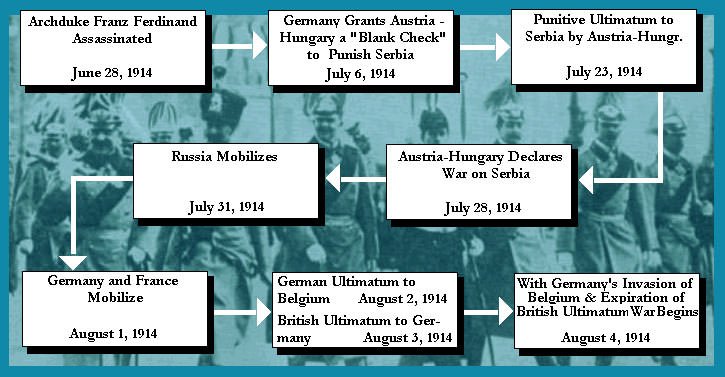
On the 6th of July, Germany issued a ‘Blank Cheque’, promising unconditional support for Austria Hungary. On 23rd July, Austria-Hungary presented Serbia with a rigid ultimatum demanding Serbia to end all anti-Austrian propaganda within Serbia; and to allow Austria-Hungary to conduct its own investigation into the Archduke’s killing. On 25th July, Serbia replied accepting all but one of the demands. Nonetheless, Austria-Hungary broke off diplomatic relations with Serbia. The following day, the British offered for a mediation conference but their offer was ignored by Germany and Austria-Hungary. Two days later, on the 28th of July 1914, Austria-Hungary declared war on Serbia.
#10 Alliances
The alliances between nations, many of them secretive are considered among the MAIN (Militarization, Alliances, Imperialism, and Nationalism) causes that led to the First World War. In the competitive and uncertain political environment of the late 19th and early 20th century, alliances between nations helped maintain a delicate balance of power. Although set up as a defensive mechanism, the alliance system meant that any major political disputes would inevitably lead to a large rather than a small conflict. Concerned over the Russian victory over the Turkish in 1878, Germany and Austria-Hungary entered into a Dual Alliance in 1879. This became a Triple Alliance in 1882 when the Italians joined.
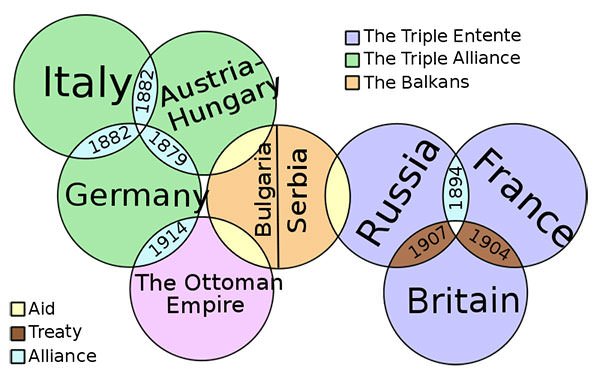
In 1894, France entered into their own Franco-Russian Alliance with Russia. They furthered their diplomatic ties with the 1904 Entente Cordiale with great Britain, while in 1907, Britain and Russia signed the Anglo-Russian Convention. These interlocking agreements came to be known as the Triple Entente. The alliance system came immediately into play after Austria-Hungary declared war on Serbia. This led to Germany declaring war on Russia on 30th July; and on France on 3rd August. They followed this by invading Belgium. On 4th of August, Britain declared war on Germany having pledged support to Belgium in the 75 year old Treaty of London. Finally, on 5th August, Austria declared war on Russia. Thus, due to the alliance system, all the major powers soon entered the conflict, escalating it into a World War.

